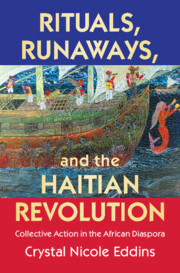Book contents
- Rituals, Runaways, and the Haitian Revolution
- Cambridge Studies on the African Diaspora
- Rituals, Runaways, and the Haitian Revolution
- Copyright page
- Dedication
- Contents
- Figures
- Tables
- Acknowledgements
- Introduction
- I Homelands, Diaspora, and Slave Society
- 1 “We Have a False Idea of the Negro”: Legacies of Resistance and the African Past
- 2 In the Shadow of Death
- II Consciousness and Interaction: Cultural Expressions, Networks and Ties, Geographies and Space
- III Collective Action and Revolution
- Conclusion
- Notes
- References
- Index
1 - “We Have a False Idea of the Negro”: Legacies of Resistance and the African Past
from I - Homelands, Diaspora, and Slave Society
- Rituals, Runaways, and the Haitian Revolution
- Cambridge Studies on the African Diaspora
- Rituals, Runaways, and the Haitian Revolution
- Copyright page
- Dedication
- Contents
- Figures
- Tables
- Acknowledgements
- Introduction
- I Homelands, Diaspora, and Slave Society
- 1 “We Have a False Idea of the Negro”: Legacies of Resistance and the African Past
- 2 In the Shadow of Death
- II Consciousness and Interaction: Cultural Expressions, Networks and Ties, Geographies and Space
- III Collective Action and Revolution
- Conclusion
- Notes
- References
- Index
Summary
The first chapter of this book begins with understanding of African histories as the headspring of cultural and political expressions in Saint Domingue, with the hopes of uncovering Africans’ and African descendants’ epistemological and ontological core. The chapter gives an overview of the African origins of slave trade captives through the lens of several themes: religion, warfare, rebellion, slavery, and anti-slavery sentiment. The chapter focuses on regions and ethnic groups most affected by French trading to Saint Domingue: Aradas and Nagô/Yorubas from the Bight of Benin, and KiKongo-speaking peoples of West Central Africa. A survey of those political cultures, African slavery and the French Atlantic slave trade, and coastal and slave ship resistances demonstrates that Africans’ consciousness was imbued with complex localized ideas about the nature of slavery – and legacies of resistance to it – before disembarking at Saint Domingue.
- Type
- Chapter
- Information
- Rituals, Runaways, and the Haitian RevolutionCollective Action in the African Diaspora, pp. 29 - 65Publisher: Cambridge University PressPrint publication year: 2021

